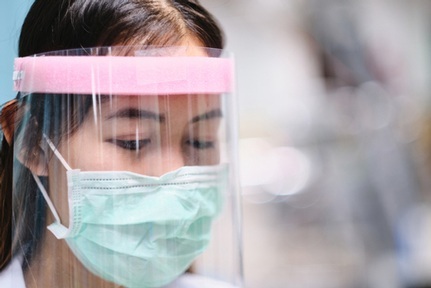Covid first wave: MPs found PPE shortages left care workers risking their lives
During the first wave of the pandemic, many care workers were put in the ‘appalling situation of having to care for people with COVID-19 or suspected COVID-19 without sufficient PPE to protect themselves from infection’, say MPs.

In its first report on PPE procurement, the House of Commons Public Accounts Committee found the Department for Health and Social Care (DHSC) ‘wasted hundreds of millions of pounds on PPE which is of poor quality and cannot be used for the intended purpose’.
MPs also found the lack of transparency over multi-million pound contracts undermined ‘public trust in government procurement and the use of taxpayers' money’. The government made extensive use of emergency procurement regulations to spend over £10 billion on goods and services without competition.
In addition, the 'Department for Health and Social Care's decision to prioritise hospitals at the beginning of the pandemic meant social care providers were left exposed by lack of PPE', according to the report.
'Government needs to acknowledge the errors and be better prepared'
Meg Hillier MP, Chair of the Public Committee, said: "Government had permission to procure equipment at pace and without tendering under the law, but acting fast did not give it license to rip up record keeping on decisions.
“It did not publish contracts in time and kept poor records of why some companies won multi-million pound contracts. The cost of emergency procurement - £billions higher than the equivalent a year before - highlights how both its pandemic plan and supply of essential equipment were inadequate.”
She added: “Frontline workers were left without adequate supplies, risking their own and their families’ lives to provide treatment and care. We’re at a dangerous new phase of the pandemic, in our third national lockdown with no defined end in sight. The government needs to acknowledge the errors and be better prepared."
The government's failure to be transparent about its buying decisions in the pandemic, which included not publishing contracts in a timely manner and not maintaining proper records of key decisions has ‘left it open to accusations of poor value for money, conflicts of interest and preferential treatment of some suppliers’, said the report.
DHSC wasted hundreds of millions of pounds on poor quality PPE
Between February and July 2020, the DHSC spent over £12 billion on 32 billion items of PPE.
The Committee says the DHSC ‘has wasted hundreds of millions of pounds on PPE which is of poor quality and cannot be used for the intended purpose.
‘The urgent need for PPE meant it accepted more risks when buying PPE than it usually would. At the time of our evidence session, some 195 million items of PPE, equivalent to around 1 per cent of those received to date, had been identified by the Department as being potentially unsuitable for their intended purpose.
‘The Department hopes that some of this can be used for other purposes. It now estimates that only 0.4 per cent of the PPE it has received failed to meet safety standards and therefore cannot be used at all and that 1.3 per cent of items were not fit for the intended purpose.
‘It has not yet estimated the amount of money that has been spent on potentially unusable items, but this will amount to hundreds of millions of pounds.’
MPs concluded that the Cabinet Office ‘is still too defensive about the lack of transparency over contract awards. We would welcome an honest understanding that, despite best endeavours in procuring vital equipment, it is necessary to be open and transparent about why decisions were made and contracts awarded.’
Staff 'were in fear' PPE would run out
In addition the report found that the DHSC claims care homes never actually ran out of PPE but MPs revealed they heard ‘compelling evidence from organisations representing frontline workers that stocks ran perilously low; single use items were reused; some was not fit for purpose - including reports of expired, substandard, deficient or even insect-infested supplies - and staff were in fear that they would run out’.
The MPs on the committee highlighted surveys by staff representative organisations which showed at least 30 per cent of participating care workers, doctors and nurses reported having insufficient PPE, even in high-risk settings.
Care providers were also faced with hugely inflated prices when attempting to buy PPE for their staff.
To read the report click here
Latest News
 29-Jul-24
Dementia Bus gives carehome.co.uk staff insight into life with dementia
29-Jul-24
Dementia Bus gives carehome.co.uk staff insight into life with dementia
 01-Mar-24
Find out the top care homes in 2024
01-Mar-24
Find out the top care homes in 2024
 21-Mar-23
UK's top care homes in 2023 revealed
21-Mar-23
UK's top care homes in 2023 revealed
 03-Jan-23
carehome.co.uk launches free care helpline
03-Jan-23
carehome.co.uk launches free care helpline
 13-Dec-22
5 mins with Emily Whitehurst, chief operating officer for Constantia Healthcare
13-Dec-22
5 mins with Emily Whitehurst, chief operating officer for Constantia Healthcare